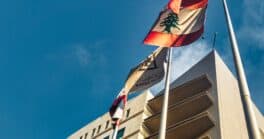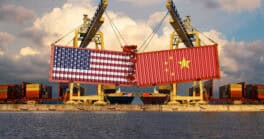BAHRAIN
NATIONAL BANK OF BAHRAIN

National Bank of Bahrain is recognized for both its wholesale activities (NBB has lead arranged several important project finance deals in the countrys modernization drive and is rated highly for trade finance) as well as its retail banking services. The bank has outstripped its competitors in its growth of savings deposits, which were up 50% over the course of 2002. NBB is well-connected throughout the Gulf region and is a strong and active participant in the areas forex markets. Recently licensed to operate in Saudi Arabia, National Bank of Bahrain is looking to further its regional role. In 2002, net profits increased by 6% to a record $51.2 million, with capital adequacy strong at 33.9%.
Abdulla Ali Kanoo, chairman
www.nbbonline.com
EGYPT
CIB
Many of Egypts big banks have been rocked by allegations of corruption and mismanagement over the past year,but CIBunlike the state-owned bankshas steered clear of scandal. Greater openness gives CIB an edge over rivals, and although the bank lags megaliths like National Bank of Egypt in terms of its retail share, its focus on high-end customers and higher fees and commissions has provided a buffer against a slow economic background. Non-performing loans rose to 5.7% of total in first-half 2002but thats against a nationwide average of several times that level. CIBs 2002 results showed a 5.2% drop in net profit after board and employee remuneration, but operations have increased and,on the back of aggressive reduction in deposits rates, net interest income grew by 15.8% over the year. Following through on its commitment to its retail business, CIB paired up with competitor Banque Misr to launch a car financing company that started business in 2002.
Hisham Ezz Al-Arab, chairman and managing director
www.cibeg.com
JORDAN
ARAB BANK
In the face of daunting challenges regional uncertainty, declining interest rates and weakness in clientsbusiness activitiesArab Bank has taken initiatives to strengthen the banks financial position, fortify internal funds and grow customer funds.
Arab Bank has created a new organizational structure by creating separate strategic business units. Credit management functions were merged in early 2002 to strengthen risk governance as well as to promote greater branch synergy. An independent private banking unit has allowed Arab Bank to enhance existing services, and the bank has introduced a broad range of new products, resulting in a 9.6% increase in customer deposits for 2002.There were good results in global treasury,and customers benefit from the implementation of a robust front-end dealing system that provides real-time exposure and profitability reporting. The bank reached a capital adequacy ratio of 17.1% in 2002.
Abdul Majeed Shoman, chairman
www.arabbank.com
KUWAIT
GULF BANK
Although in May Global Finance named National Bank of Kuwait best bank in the region, Gulf Bank pips NBK to the post in terms of domestic strength.Gulf Bank has continued the introduction of innovative products and promotions through 2002. Robust online trading in conjunction with Ameritrade, a world cup soccer program with MasterCard, a range of Visa credit cards and the cash-prizewinning Al Danah account have attracted a deep customer base and in turn led to record profits of Kd45.5 million posted for 2002. Gulf Bank has invested in new and better branches, upgraded its IT platform and networks and has increased frontline staff by 10%. It maintains, nonetheless, the lowest cost-to-income ratio of any bank in Kuwait. Gulf Banks return on assets for 2002 was down marginally on the previous year at 2.35%, but its return on equity held up at an impressive 21.4%.
Bassam Alghanim, chairman and managing director
www.gulfbank-online.com
LEBANON
BLOM BANK
A conservative approach to lending has put BLOM Bank in better stead than its competitors. Asset quality is good, with doubtful loans accounting for just 5.85% of the total, against 12% for Lebanons banking sector as a whole. Caution also prevails in the banks decision to hold large amounts of foreign currency as a hedge in case of devaluation; Lebanon faces a large debt refinancing this year and next,as well as a rising budget deficit. BLOM is building on its already-extensive international network (which spans Geneva, Paris and London) by expanding its presence in Syria. Bank of Jordan gave the go-ahead for Blom to open a main office in the kingdom. BLOMs consolidated profits for 2002 reached $83.57 million, up slightly from the previous years $80.2 million.The bank achieved a return on average equity of 19.7% and return on average assets of 1.24%.Assets grew 13.7% to reach $7.15 billion at the end of 2002. Naaman Azhari, chairman and general manager www.blom.com.lb MOROCCO BANQUE COMMERCIALE DU MAROC Moroccos banking sector is more developed than one might expect in a country where business is often unregulated and lacks transparency. BCM has built on its solid core banking servicesat the end of last year, the bank accounted for 17% of all deposits, 17.2% of all loans and 25% of all international transactionsto offer the countrys 30-million population additional financial services. These include credit insurance, housing development loans, asset management and offshore banking. Many of these products are offered with European financial entities, such as BCMs shareholders Banco Santander Central Hispano and French insurer AXA. With its international network of associates and its experience in processing and financing foreign trade transactions, BCM is well placed to welcome potential investors into Morocco.
Khalid Oudghiri, president
www.attijaribcm.com
OMAN
BANKMUSCAT
BankMuscat has pursued an acquisitive strategy, merging with Commercial Bank of Oman and, in 2002, taking over the operations of brokerage Al Ahlia Securities. A takeover of Industrial Bank of Oman became effective in 2002, and BankMuscat has increased its regional operations with the purchase of ABN AMROs Bahrain branch.
The bank expresses hopes soon to establish full banking operations in the UAE.And, applying to convert its India branch into a local entity, BankMuscat aims to diversify its interests further around the Indian Ocean.
Net profit rose more than 195% last year. Operating income increased by 28.5% in 2002, while operating expenses were down by 36.7%. Net interest income increased by 25.9%.Return on average equity rose from 6.6% to 16.3%.
AbdulMalik bin Abdullah Al-Khalili, chairman
www.bankmuscat.com
QATAR
QATAR NATIONAL BANK
Qatar National Banks improved foreign currency deposits credit rating in 2002Moodys upgraded the bank from Baa2 to A3, and Fitch from BBB+ to Awas matched by improved profits, with net profits up 10%.The bank plays a major role in Qatari project finance initiatives and loan syndications such as the August 2002 loan for $300 million to Qatar Fuel Additives Co.
With offices in Paris and London, QNB is able to target international clients and has grown its corporate loan portfolio as well as engineered a number of large real estate deals. Back home, the bank has enlarged its ATM network, opened new branches and is pioneering Internet banking. In 2001, in partnership with MasterCard International and the Ritz-Carlton Doha, QNB was the first bank in Qatar to issue a co-branded credit card. Its return on equity was 14% in 2002.
Saeed Al-Misnad, CEO
www.qatarbank.com
SAUDI ARABIA
ARAB NATIONAL BANK
ANB has transformed itself in recent years.The bank has breathed new life into its product line-up, taken a grip on its bad loans and attracted customers with innovations such as phone and Internet banking. Products offered include car loans, a string of investment funds managed by Goldman Sachs and a range of Islamic finance products such as a Shariacompliant credit card and Islamic commodity financing.
ANBs operations structures have been rejigged;the bank has decentralized some parts of its business, for example, through the establishment of specialized commercial centers, and other elements,such as loan and credit processes, have been integrated. In 2002, net income rose by 20%.
Nemeh Sabbagh,CEO
www.anb.com.sa
SOUTH AFRICA
STANDARD BANK
Despite inflation worries, South Africas economy is reaping the benefits of greater political stability. Standard Bank is capitalizing on this, as well as its successful banking businesses across Africa. Headline earnings for 2002 were up 19%, despite damage caused by deteriorating global credit markets in the second half of the year. The groups domestic loan book ended the year up 13%, reflecting strong growth in high-yielding assets such as home loans, installment finance and card balances.
Meanwhile, Standard Banks broader African operation, Stanbic Africa, expanded its continental presence further with an 80% stake in Ugandas largest bank by assets. This gives the group a position in 17 countries across Africa. Return on equity increased to 20.3% in 2002.
Jacko Maree, CEO
www.standardbank.co.za
TUNISIA
BANQUE DE TUNISIE
Tunisia is more prosperous than larger francophone colleagues Morocco and Algeria, but the countrys financial sector is hampered by a lack of transparency from the Tunisian regime. Although smaller than other banks in Tunisia, Banque de Tunisie has performed excellently in services to small and medium enterprises in the country. In July 2002 the African Development Bank approved a $29.9 million line of credit to the bank to finance projects in the country, creating some 1,000 new jobs in Tunisia.
Over the year 2001, Banque de Tunisie achieved a 15.52% return on equity and grew its assets by 11.18%.
Faouzi Bel Kahia, president
UAE
NATIONAL BANK OF DUBAI
NBD has invested heavily in new technology and in personnel, resulting in strong growth in corporate and retail banking, both backed up by a successful treasury infrastructure.
Aiming to have a workforce of at least 40% UAE nationals by 2005,NBD has invested heavily in local training, and although this meant a 19% increase in operating costs over 2002, an operating income increase of 26% preserves NBDs position as one of the most cost-efficient banks in the emirates. Last year, customer deposits grew 8.1%, and total assets 7.7%.
NBD reported a 25% increase in net profits in 2002, and its return on equity rose from 9.76% the previous year to 10.36%.
Khalifa Mohamed Ahmed Sulaiman, chairman
www.nbd.com


